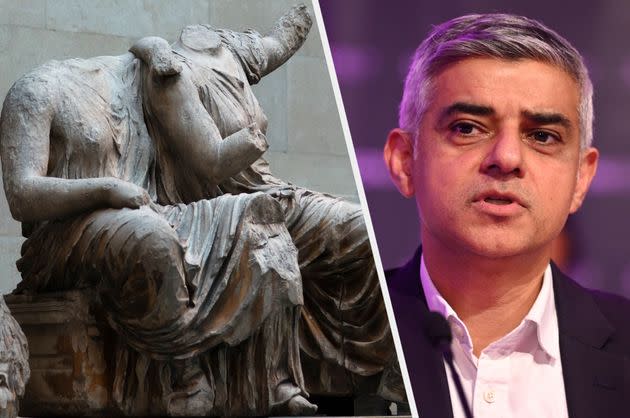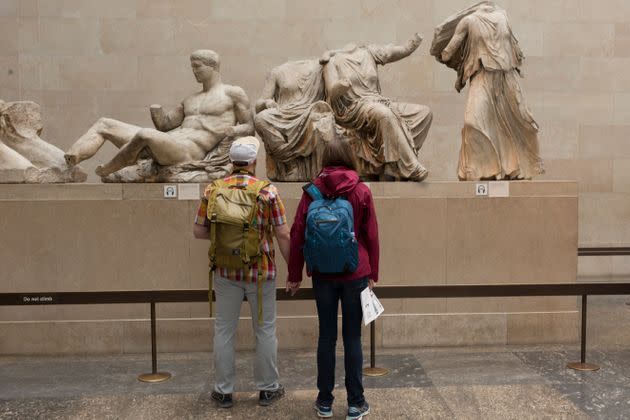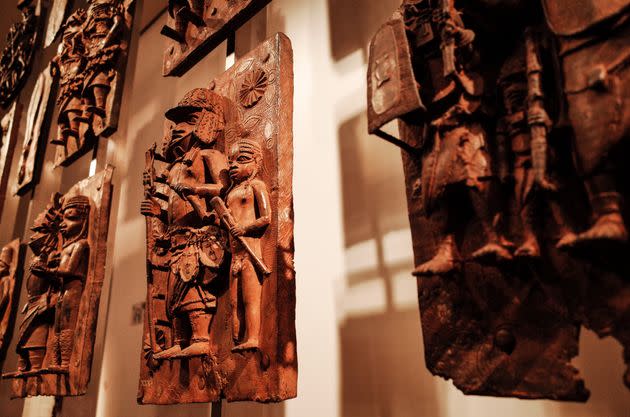Exclusive: Sadiq Khan Says Deal Should Be Done With Greece Over Elgin Marbles

The Elgin Marbles and Sadiq Khan (Photo: Getty)
Sadiq Khan has said that a deal should be done with Greece to find a way of sharing the Elgin Marbles.
The mayor of London called on the British Museum, UK government and Greek government to work together to “make progress” in the dispute.
He joked that it was the “end of my career” because he agreed with former chancellor George Osborne on the issue.
Osborne, chairman of the trustees of the British Museum, recently said they should find a way of sharing the ancient sculptures with Greece.
Athens has long demanded the marbles, once situated in the ancient Greek Parthenon temple, are returned.
In an exclusive interview with HuffPost UK, Khan said: “It’s probably the end of my career when I say I agree with George Osborne.

Visitors admire the sculpture of the ancient Greek Parthenon's Elgin Marbles Metopes in the British Museum. (Photo: Richard Baker via Getty Images)
“I think it’s important to have these discussions. I think generally speaking discussion is always good and dialogue is always good and it’s refreshing to hear the British Museum talking in this way.
“I’d really encourage the British Museum, the British government and the government of Greece and the relevant appropriate place - the museum in Athens - to talk about how we can make progress on this issue.
“There’s a discussion, not just in terms of the Elgin Marbles, but across the globe in relation to some of the wonderful things we have on exhibition in our city.
“I want them to stay in our city, but why can’t we share them? Why can’t we work with other cities across across the globe to have a situation where people, who can’t come to London, can’t enjoy the wonderful British Museum, can enjoy seeing some of this stuff in other places as well?
“I think if George can begin the conversation, and it leads to better relationships, then all the better.”
The sculptures were brought to Britain in the 19th century after the 7th Earl of Elgin removed them from the Parthenon in Athens with permission from the Ottoman authorities, which had ruled the city for 400 years.
The British Museum is unable to give up ownership of the sculptures under the terms of the 1963 British Museum Act.
The museum has come under increasing pressure to reevaluate some of its artefacts including the Benin Bronzes.
The bronzes were looted by a British military expedition in 1897 and are considered to be among Africa’s most culturally important artefacts.

Detail of the contentious Benin plaques exhibit at the British Museum. (Photo: SOPA Images via Getty Images)
Germany recently handed over two Benin bronzes and put more than 1,000 other items from its museums’ collections into Nigeria’s ownership.
Khan added: “There’s no reason at all why we can’t show the strength of our friendship with other countries, whether it’s Greece or what Germany has done to share some of this stuff.
“We’ve treated it as a virility test, we equate it wrongly, in my view, with patriotism and it gets confused with nationalism.
“This sort of progressive conversation is what’s needed and I welcome George beginning the conversation. That’s the end of my career.”
It recently emerged that prime minister Boris Johnson had argued for the restitution of the Elgin Marbles in a letter to a senior Greek government minister while studying at Oxford.
Last year Johnson issued a point-blank rejection of any attempt to return the ancient marbles to Greece, insisting they would remain in Britain because they had been legally acquired.
But in previously unpublished letters, written in 1986 when Johnson was an undergraduate at Oxford University and Oxford Union president, he argues for the ancient sculptures’ “immediate” repatriation, accusing the British government of “sophistry and intransigence”.
'I think there's a deal to be done.'
Chairman of the British Museum George Osborne suggests that the Elgin Marbles could be returned to Greece 'at least for a while'.@AndrewMarr9 | @George_Osbornepic.twitter.com/ZLqMwyA8vM— LBC (@LBC) June 14, 2022
Last month, Osborne told Andrew Marr on LBC: “I think there’s a deal to be done, I think there’s a deal to be done where we can tell both stories in Athens and in London.”
He added: “If we both approach this without a load of preconditions, without a load of red lines, and we sit down as sensible people because I think sensible people can arrange something that makes the most of the Parthenon Marbles, but if either side says there’s no give at all, then there won’t be a deal.”
Marr suggested that some of the sculptures would move to Greece “at least for a while, and then they would come back to London”.
Osborne replied: “Sensible people should come up with something where you can see them in their splendour in Athens, and see them among the splendours of other civilisations in London.”
This article originally appeared on HuffPost UK and has been updated.

 Yahoo News
Yahoo News 